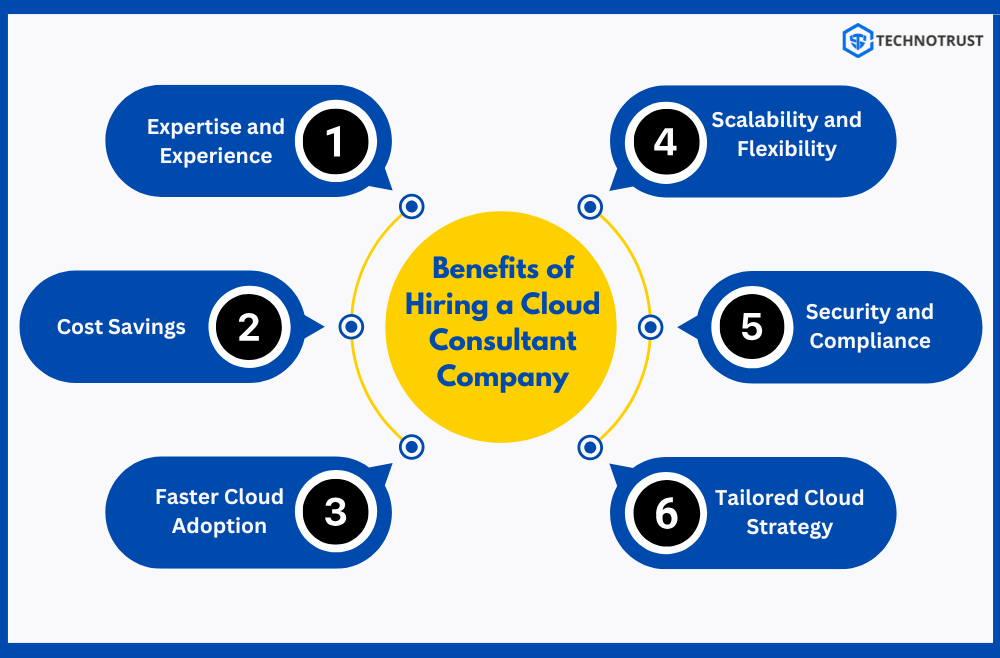In today’s digital world, all businesses are increasingly looking to adopt cloud solutions and looking for Cloud Consultancy services to streamline operations, enhance scalability, and reduce costs. As cloud technology becomes integral to business strategy, the role of the Cloud Consultant has gained significant prominence. A cloud consultant helps organizations navigate this complex shift by advising on the right solutions, designing strategies for cloud adoption, and ensuring smooth transitions from traditional infrastructure to cloud-based systems.
In this blog, we will explore the role of a cloud consultant in-depth, including their responsibilities, skills, benefits to organizations, the tools they use, and the career prospects in the cloud industry
What is a Cloud Consultant?
A Cloud Consultant is a Cloud Computing professional who helps businesses consult on how they optimize their business workflow. The primary focus of a cloud consultant is to guide businesses through the process of moving their data and applications to the cloud, optimizing cloud performance, and providing ongoing management and support.
Cloud consultants have expertise and typically work with a variety of cloud platforms such as Amazon Web Services (AWS), Microsoft Azure, Google Cloud Platform (GCP), and others, offering their expertise in designing and implementing cloud infrastructures that align with the client’s business goals.

Responsibilities of a Cloud Consultant.
The role of a Consultant is multifaceted and requires a blend of technical expertise, strategic thinking, and strong communication skills. Below are the key responsibilities:

- Assessing Client Needs: The first step they take is to thoroughly understand the client’s business needs, objectives, and existing IT infrastructure. This may involve discussions with IT teams, business managers, and other stakeholders to ensure a clear understanding of the organization’s challenges and goals.
- Recommending Cloud Solutions: Once the consultant has a strong understanding of the client’s needs, they recommend the most suitable cloud solutions that suit their client’s business. These could range from public, private, or hybrid cloud solutions depending on the nature of the organization, its data security needs, and scalability requirements.
- Designing Cloud Architecture: After selecting a cloud platform, the cloud consultant is responsible for designing a scalable, secure, and efficient cloud architecture. This involves choosing the right storage, computing resources, security protocols, and data management strategies.
- Migration Planning and Execution: One of the key challenges many businesses face is migrating their existing systems, applications, and data to the cloud. They play a critical role in planning and executing the migration. This includes determining which assets need to be migrated, how the migration will be carried out, and how to minimize disruptions to business operations.
- Optimizing Cloud Performance: Once the migration is complete, continue to monitor the cloud infrastructure and fine-tune it for optimal performance. This may involve improving load balancing, ensuring cost efficiency, and scaling cloud resources to meet changing demands.
- Cloud Security and Compliance: Security is a major concern for businesses moving to the cloud. A Cloud Consultant must ensure that the client’s data is secure and meets industry-specific regulatory requirements. This includes setting up proper encryption, access controls, and monitoring tools to mitigate potential risks.
- Providing Ongoing Support: Cloud adoption doesn’t end with the initial setup and migration. They provide ongoing support, ensuring systems remain up-to-date, secure, and optimized for performance. This may involve managing software updates, disaster recovery processes, and troubleshooting technical issues.
- Training and Knowledge Transfer: Cloud consultants also play an important role in educating the client’s internal teams on how to manage and operate cloud infrastructure effectively. This can include conducting training sessions and creating user-friendly documentation for internal staff.
Skills and Expertise Required.
A Cloud Consultant needs a diverse set of skills to succeed in their role. These range from technical expertise in cloud platforms to soft skills like communication and problem-solving. Here are some of the key skills required listed below:
- Technical Expertise in Cloud Platforms: They must be experts in the major cloud platforms such as Amazon Web Services (AWS), Microsoft Azure, and Google Cloud Platform (GCP) Additionally, knowledge of various cloud tools like Terraform, Kubernetes, and Docker is often necessary.
- Understanding of Cloud Architecture and Design: A deep understanding of cloud architecture is essential for designing scalable and efficient systems. This includes knowledge of infrastructure as a service (IaaS), platform as a service (PaaS), and software as a service (SaaS).
- Data Management and Security: Understanding data migration strategies, backup solutions, and security protocols such as encryption, firewalls, and multi-factor authentication is crucial.
- Cost Management and Optimization: Cloud solutions can be costly if not managed properly. Cloud consultants need to be skilled in cloud cost management tools and strategies to help businesses optimize their cloud spending.
- Problem-solving and Troubleshooting: Since cloud adoption and migration can be complex, a consultant must be able to troubleshoot technical issues and implement effective solutions quickly.
- Communication and Collaboration: Cloud consultants need strong communication skills to work with a wide range of stakeholders, from technical teams to C-suite executives. They must be able to translate complex technical concepts into clear business language.
- Project Management: Since cloud adoption involves many moving parts, cloud consultants often need to manage projects from start to finish. Familiarity with project management tools and methodologies like Agile is often beneficial.
Benefits of Hiring a Cloud Consultant Company.

Organizations can derive several benefits from hiring a cloud consultant. Here are some of the key advantages:
- Expertise and Experience: Cloud consultants bring specialized knowledge and experience to the table. They have the technical know-how to design cloud solutions that are both efficient and secure, which may not be available in-house.
- Cost Savings: Cloud consultants help businesses optimize their cloud infrastructure, ensuring that they only pay for the resources they need. They also help in selecting the right cloud model (public, private, or hybrid) to match the organization’s budget and objectives.
- Faster Cloud Adoption: A consultant’s expertise ensures that the migration process is smoother, reducing downtime and minimizing the risks associated with the adoption of new cloud technologies. They can ensure the transition happens quickly and with minimal disruption.
- Scalability and Flexibility: Cloud consultants help businesses design solutions that scale with growth. This is particularly important for startups and rapidly expanding businesses that need the flexibility to adjust their cloud resources as needed.
- Security and Compliance: Security is a critical concern when moving to the cloud, and a cloud consultant ensures that all security protocols are in place. Additionally, consultants ensure that cloud infrastructure meets regulatory compliance requirements, which is essential for businesses operating in regulated industries.
- Tailored Cloud Strategy: Every business has unique needs, and a cloud consultant helps craft a tailored cloud strategy that aligns with the organization’s goals, resources, and constraints. This customized approach helps businesses get the most out of their cloud investments.
Tools and Technologies Used by Cloud Consultants.
Cloud consultants rely on various tools and technologies to perform their jobs effectively. Here are some of the most common ones:
- Cloud Management Platforms: These platforms help cloud consultants monitor, manage, and optimize cloud resources. Examples include: Cloud Health, Cloud Checker, and AWS CloudFormation
- Cloud Automation Tools: Tools like Terraform, Ansible, and Chef enable consultants to automate the provisioning and management of cloud resources, reducing the chances of human error and improving efficiency.
- Security and Compliance Tools: Security is a top priority in cloud consulting. Cloud consultants use various tools to monitor and ensure the security of cloud infrastructure, including CloudTrail (AWS), Azure Security Center, and Google Cloud Security Command Center
- Monitoring and Analytics Tools: Tools such as Datadog, New Relic, and Prometheus allow cloud consultants to monitor the performance of cloud infrastructure and applications, ensuring optimal performance.
- Career Outlook and Opportunities: The demand for Cloud Consultants has surged in recent years as businesses increasingly recognize the importance of cloud technologies. The cloud consulting market is expected to continue growing, offering strong career prospects.
- Key Industries Hiring Cloud Consultants: Cloud consultants are in demand across various industries, including IT Services and Consulting, Finance and Banking, Healthcare, Retail, Telecommunications, and Manufacturing.
Conclusion
Cloud consultants are indispensable in today’s digital world, helping businesses navigate the complexities of cloud adoption, optimize performance, and ensure security. As more companies embrace cloud technology to enhance their operations, the demand for skilled cloud consultants will continue to rise, making it an exciting career path for those interested in cloud computing and IT consulting.
Whether you’re an organization looking to leverage the cloud or an individual exploring a career in cloud consulting, understanding the intricacies of this role is essential for success.


